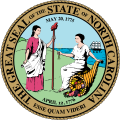 Logo of the North Carolina Department of Commerce | |
| Agency overview | |
|---|---|
| Formed | 1971 |
| Headquarters | 301 North Wilmington Street, Raleigh, North Carolina |
| Agency executive |
|
| Website | www.commerce.nc.gov |
The North Carolina Department of Commerce was formed in 1971 by the North Carolina State Government Reorganization Act. The department is headed by the Secretary of Commerce, who is appointed by the Governor of North Carolina. The Secretary is part of the Governor's Cabinet. The chief function of the department is to connect businesses with locations, workforce and infrastructure in North Carolina that businesses need to succeed. The department also connects local communities with grants and funding sources to attract new business to North Carolina. The department also staffs and receives policy guidance from: the North Carolina Board of Science, Technology, and Innovation; the NCWorks Commission; and the Rural Infrastructure Authority. [1] [2]
